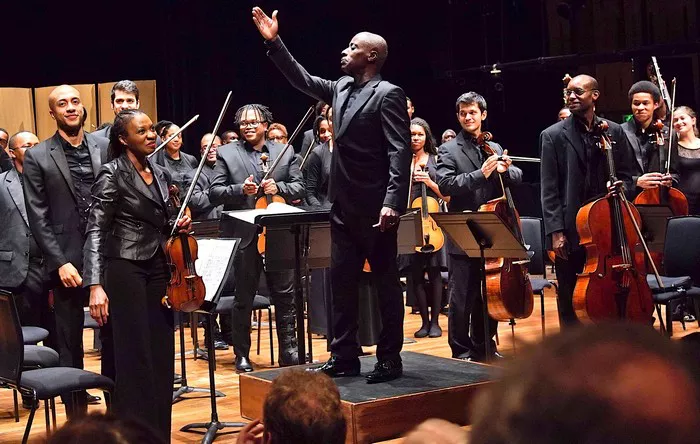Classical music, often regarded as a timeless treasure trove of musical expression and artistry, encompasses a wide array of genres and styles that have evolved over centuries. This article delves into the fascinating world of classical music, highlighting its five prominent genres. From the grandeur of the symphony to the intimacy of chamber music, classical music offers a rich tapestry of emotions and sounds that have resonated with audiences for generations.
1. Symphonic Grandeur: The Epitome of Classical Music
When we think of classical music, the first genre that often comes to mind is the symphony. Symphonies are the crown jewels of classical composition, epitomizing the grandeur and complexity that classical music can achieve. A symphony typically consists of four movements, each with its own distinct character and mood. The use of a full orchestra, including strings, woodwinds, brass, and percussion, creates a rich and majestic sound that is quintessentially classical.
Classical music has produced some of the most renowned symphonies in history, with composers like Ludwig van Beethoven, Wolfgang Amadeus Mozart, and Pyotr Ilyich Tchaikovsky leaving an indelible mark on the genre. Beethoven’s Symphony No. 9, famously known as the “Choral Symphony,” is a testament to the enduring power of classical music to move and inspire listeners with its profound emotional depth and complexity.
2. Concertos: Showcasing Virtuosity in Classical Music
Concertos are another captivating genre within the realm of classical music. These compositions highlight the virtuosity of a solo instrument, such as the piano, violin, or flute, often accompanied by an orchestra. The concerto format allows composers to explore the full range of the solo instrument’s capabilities while weaving it into a larger orchestral tapestry.
Mozart’s Piano Concerto No. 21 and Tchaikovsky’s Violin Concerto are prime examples of the brilliance and technical prowess displayed in classical music’s concerto genre. These compositions not only showcase the soloist’s skill but also demonstrate the seamless integration of solo and orchestral elements, creating a harmonious dialogue that defines classical music.
3. Chamber Music: Intimacy and Collaboration in Classical Music
In contrast to the grandeur of symphonies and concertos, chamber music in the world of classical music offers a more intimate and collaborative experience. Chamber music is written for small ensembles, typically comprising a handful of musicians, and is designed to be performed in smaller, more intimate settings. This genre allows for close interaction and communication among the musicians, making it a unique and cherished facet of classical music.
The string quartet, a popular form of chamber music, exemplifies the beauty of classical music’s intimate expression. Compositions like Ludwig van Beethoven’s late string quartets reveal the depth of emotion and intellectual rigor that can be achieved in this genre. The interplay between the instruments and the subtle nuances of expression in chamber music showcase the versatility and depth of classical music.
4. Opera: A Fusion of Music and Drama in Classical Music
Opera represents a fusion of music and drama, captivating audiences with its powerful storytelling and emotive melodies. In classical music, opera is a genre where singers take center stage, accompanied by an orchestra. The vocal performances are often accompanied by elaborate sets and costumes, creating a multisensory experience that is both visually and aurally enchanting.
Classical music’s operatic repertoire is vast and diverse, with timeless works like Giuseppe Verdi’s “La Traviata” and Wolfgang Amadeus Mozart’s “The Magic Flute” continuing to grace stages worldwide. These operas, with their compelling narratives and soaring arias, showcase the ability of classical music to evoke deep emotions and convey complex human stories.
5. Choral Music: Voices in Harmony within Classical Music
Choral music is the final genre we explore within the realm of classical music. It involves the use of vocal ensembles, ranging from small choirs to large-scale orchestral choruses, to convey the composer’s message. The human voice, with its ability to convey emotion and tell stories, is at the forefront of this genre.
Masters of classical music, such as Johann Sebastian Bach and Johannes Brahms, have left an indelible mark on choral music with their intricate choral compositions. Bach’s “St. Matthew Passion” and Brahms’s “A German Requiem” are prime examples of how classical music can transcend time and connect with the deepest emotions of the human spirit through choral harmonies.
Conclusion
In conclusion, classical music encompasses a rich tapestry of genres that have endured through the ages, captivating audiences with their diverse expressions of human emotion and creativity. From the symphonic grandeur of symphonies to the intimate collaborations of chamber music, from the virtuosic solo performances of concertos to the dramatic storytelling of opera, and from the harmonious voices of choral music, classical music continues to inspire and move people around the world.
The enduring appeal of classical music lies in its ability to evoke deep emotions, tell compelling stories, and showcase the virtuosity of musicians. Whether you are drawn to the majestic soundscapes of a symphony, the intimacy of a string quartet, or the passionate arias of an opera, classical music has something to offer every listener. Its timeless legacy continues to enrich our lives and connect us to the beauty of human expression through the language of music. Classical music, with its enduring power and grace, remains a treasure trove of artistry for generations to come.

